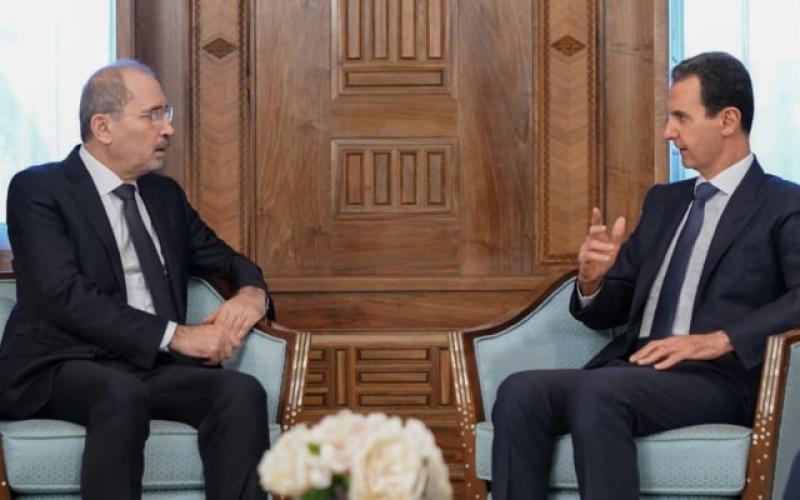Will the Jordanian initiative succeed in finding a solution in Syria?

Translated by Matthew Petti
Jordan is working to smooth over relations between Bashar al-Assad’s regime in Syria and other Arab states, as part of an initiative seeking to resolve the security and humanitarian files in the region.
Jordanian diplomats began promoting the initiative on Tuesday, with a meeting between Jordanian foreign minister Ayman Safadi and his Lebanese counterpart Abdullah Bouhabib.
The initiative “starts by recognizing current Syrian realities,” a Jordanian source told Amman et, and tries to avoid “leaving the field to regional states that are [already] present in Syria, due to the years-long Arab absence.”
Safadi said that “the Kingdom is working in coordination with the international community to reach a political solution to the Syrian crisis through the Jordanian initiative. It is based on the Arab states engaging directly with the Syrian government through the step-by-step method, in order to reach a gradual solution to this crisis and address all of its political, humanitarian, and security consequences.”
Through consultations, Jordan seeks to gradually ease sanctions against the Assad regime, start reconstruction, ensure a safe return of refugees, and began a national reconciliation that includes the release of detainees and engagement in a democratic political process.
Jordan is also seeking to integrate Syria into major economic projects, particularly the project to link Syria and Lebanon to the Jordanian electrical grid.
However, the initiative “is not free of charge or conditions,” the Jordanian source emphasized to Ammannet.
“Jordan will present the initiative to Arab countries, which will in turn set their own conditions for restoring diplomatic relations with Syria,” the source said. “For example, what worries Jordan is arms and drug trafficking from inside Syria, and the need for Syria to make a greater effort combatting it.”
Jordan has a “special relationship” to the Syrian crisis, said Dr. Khaled Shneikat, head of the Jordanian Political Science Society. He noted the economic and infrastructure pressure caused by 1.3 million Syrian refugees, the “lack of security on the Syrian border,” and the loss of Syria as Jordan’s “export gateway” to Turkey and Europe.
The two countries share a 375 km border. Iranian-backed militias and drug traffickers proliferate on the Syrian side, while extremist attacks have sometimes punctured the Jordanian side.
British government spokeswoman Rosie Dyas recently wrote on Twitter that “the sale of captagon by the Assad regime has reached industrial scale. The revenues for the regime amount to $57 billion per year, nearly three times the drugs traded by all the Mexican cartels together. It represents 80% of the global supply of the drug.”
As for the Arab states, they prefer Syria to be “an independent and sovereign country, and for militias not to be present on its lands,” Shneikat says.
The Jordanian initiative is an opportunity to establish an Arab strategic depth in southern Syria, according to a position paper by Jalal Selmi, writing for the Strategiecs think tank.
Building on the quadrilateral agreement to build an Arab gas pipeline from Egypt to Lebanon, and the growing tripartite partnership with Egypt and Iraq, Jordan may seek to attract Syrian and Russian participation in economic projects, according to the paper.
However, the Syrian position on the Jordanian initiative is still unclear, the paper notes, especially as the Syrian government seeks to implement a “zero-sum” solution in the south, meaning the return of full regime control to Daraa Governorate and the neutralization of opposition groups there.
Jordan’s initiative depends on “the principle of step-by-step progress,” as Safadi put it. In other words, the Syrian regime should make concessions in order for the initiative to advance. Jordan expects the Syrian regime to take positive steps on the humanitarian and security files.
“The success of the Jordanian initiative will be very difficult,” retired Maj. Gen. Mamoun Abu Nuwar told Ammannet. “It will collide with UN Security Council Resolution 2254 — calling for a ceasefire and a political settlement in Syria through a new constitution and elections — which the Assad regime won’t accept.”
However, Jordan’s priority is “reducing the Iranian presence near the Jordanian border, controlling drug and arms trafficking, and benefiting economically after a slump in trade,” he said. “The most important question is: can the initiative can succeed without American approval and Russian agreement?”












































